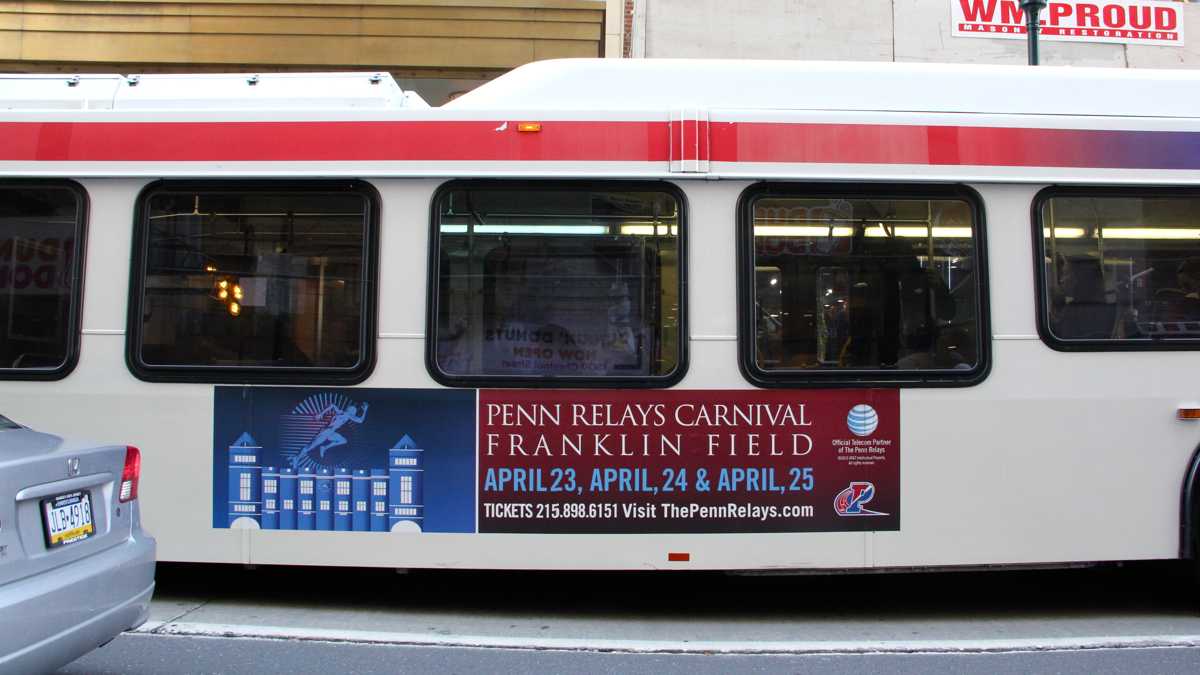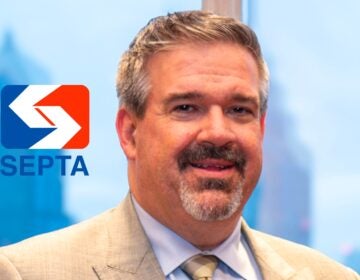Chilly reception: New SEPTA ad policy will prohibit ads welcoming Pope, DNC

Philadelphia is pulling out all the stops to welcome Pope Francis when the leader of the Roman Catholic Church visits in September: organizers are amassing a heavenly host of volunteers ten-thousand-strong, unions are promising to behave like choir boys, and His Holiness is getting an honor usually reserved for now-geriatric former teen heartthrobs, professional athletes, Dr. Quinn Medicine Woman, and polarizing politicians: his very own mural.
But while the rest of Philadelphia will be frocked in signage welcoming the Bishop of Rome, the region’s buses and trains will remain relatively free of Pope-related proclamations, thanks to SEPTA’s new ad policy. The policy, adopted in the wake of a federal court opinion forcing the transit authority to allow a divisive ad equating Islam and Nazism, bans all ads on religious, political and social issues.
That means any advertisement related to the Vicar of Rome’s visit – or the DNC in 2016 – will probably be verboten, says Gino Benedetti, General Counsel for SEPTA.
“It depends,” says Benedetti.
Benedetti says SEPTA will “remain true” to the standards and is “willing to forgo the revenue” from ads that violate the broad new advertising policy, but adds that SEPTA will try to work with the rejected advertisers, “to see if there is a way to make the ad compliant with the policy.”
Whereas an ad welcoming His Holiness to Philadelphia wouldn’t be kosher, a banner promoting a Catholic organization’s welcoming event, open to the public – papists and apostates alike – would be copacetic.
That’s certainly a sensible business plan for a transit authority trying to maximize its advertising revenues, but it comes with legal risks. SEPTA is toeing the line between enforcing the policy and working around the policy. If SEPTA takes a step too far around that delicate line, the agency could find itself once again fighting a losing battle against offensive advertisers.
And given that the new policy adds a number of restrictions sure to offend litigation happy groups such as plaintiffs attorneys and the National Rifle Association, it may be just a matter of time before SEPTA is dragged back into court and forced to run another offensive ad.
WHAT’S PAST IS PROLOGUE
SEPTA never intended for its bus banners and station billboards to host a heated debate about the Middle East, says Benedetti.
When the transit authority rejected the American Freedom Defense Initiative’s “Islamic Jew-hatred: it’s in the Quran” advertisement, AFDI sued, arguing that SEPTA—a government entity falling under the First Amendment’s penumbra—was regulating speech on its “designated public forum” (i.e. advertising space) based on its content. Courts review a designated public forum’s content-based restrictions with “strict scrutiny”, which is legalese for “pretty much never constitutional”.
SEPTA countered that its advertising space was really a “non-public forum”, meaning broad content-based restrictions would be permissible, provided they were merely “reasonable” and “viewpoint neutral”.
In other words, SEPTA’s ban on all political or religious ads is fine for a non-public forum, but not for a designated public forum.
To the Supreme Court’s ears, speech in public forums, like public theaters and parks, should almost never be restricted, short of practical matters like reasonable noise ordinances and proscriptions of porn or profanity. Speech in non-public squares, like the break room post it board in an IRS office or signs at City Hall, can be restricted because it’s not really a place for enlightened debate. Advertising spaces on government property can go either way.
Whether a forum is designated public or non-public depends on the government’s intentions for the space. In AFDI case, Benedetti testified that SEPTA totally intended its ad space to be non-public. So, case closed, right?
Not quite. In turns out that government agencies sometimes lie, so courts look beyond policy statements and officials’ testimony. So while in theory SEPTA had a non-public forum policy, because it ran a few ads on public issues like fracking, contraceptive use, and teacher seniority – just 1% of SEPTA’s ads over the last four years – SEPTA was actually operating a designated public forum in practice.
Thus, under the far more restrictive strict scrutiny review, SEPTA’s old policy didn’t stand a chance. And its new policy wouldn’t either, which is why ensuring that subsequent courts declare its advertising space a non-public forum is so critical.
THE ROAD TO PERDITION…
Benedetti says SEPTA tailored its new advertising policy around Judge Mitchell Goldberg’s decision and another similar decision handed down by the 9th Circuit in Seattle to make it “extremely clear” that SEPTA’s ad space is not a designated public forum.
The policy now includes a provision stating; “It is the express intention of these Advertising Standards” that SEPTA’s ad space “be a non-public forum.”
Benedetti says SEPTA fully intends to follow the new advertising standards to the letter, but will “work with” advertisers they might reject, trying to make the proposed ads compliant. That move may expose SEPTA to subsequent lawsuits.
SEPTA must treat every advertiser the same, no matter how heinous a viewpoint they present. The First Amendment’s free speech clause is more concerned about government picking and choosing sides in a debate than providing a forum for the debate, so the safer path, legally, is to steer clear of anything controversial.
But SEPTA’s new advertising standards already seem designed to be contested, and some elements are likely to be ignored, which could prove problematic.
The advertising standards prohibiting ads “disparaging, disreputable, or disrespectful to persons, groups, businesses or organizations, including advertising that portrays individuals as inferior, evil or contemptible.”
The problem, of course, is that lots of ads disparage or disrespect businesses – it’s how companies differentiate themselves from the competition.
Should SEPTA continue to allow the “we’re better than the competition” type ads – think Verizon’s LTE coverage ads – when the next AFDI comes along with a disparaging ad, they could argue that the selective enforcement of the policy operates as a viewpoint-based restriction – never allowed – or suggests a the policy was mere pretext. Similarly, the advertising standards could be considered merely pretextual or viewpoint-based if SEPTA appeared to be more willing to work with some groups, but not others, in skirting around the policies to make non-compliant ads acceptible.
In either scenario, the court would likely find an intention to create a designated public forum, meaning the content-based restrictions – like banning political and religious advertisements – would be unconstitutional.
Benedetti knows he’s walking a fine line and admits that the new standards would be in trouble if a court decided that SEPTA was intending to create a designated public forum. “I don’t know if it would satisfy strict scrutiny,” says Benedetti.
…IS PAVED WITH GOOD INTENTIONS
The new advertising standards prohibit 24 types of advertising content, everything from ambulance chaser ads aimed at SEPTA (“Advertising that offers legal or other services related to SEPTA and not in SEPTA’s best interest as determined by it.”) to bans on gaudy or profane ads (“Advertising that is aesthetically inappropriate…”; “Advertising that employs or implies profanity or vulgarity.”)
Also banned are gun ads, even though Benedetti admits that SEPTA hasn’t received any in recent history. Benedetti says SEPTA’s intention is simply to provide its ridership with safe, pleasant experience, and ads related to firearms would militate against that.
The plaintiff’s bar and the NRA may be the two most lawsuit happy groups in America. In addition to the concern that other AFDI-type organizations might challenge the new policy, adding these restrictions all but ensures that SEPTA will find itself in federal court defending its advertising standards for the third time in less-than-twenty years.
A NATIONAL TREND
Having to say no to ads related to the Pope and the DNC in 2016 won’t exactly kill SEPTA’s bottom line. Issues advertisements like those only made up 1% of ads for SEPTA over last four years. Even if that amount doubled or tripled because of the two major events, it would hardly be a blip in the $34 million SEPTA receives annually in ad revenue.
It’s a much larger issue in Washington D.C., though, where the Metro advertisements, aimed at government employees and congressional staffers, make up about 20 percent of the agency’s annual advertising income.
Like SEPTA, Metro decided to ban all political ads in response to efforts by the AFDI to place anti-Muslim-themed ads. AFDI has so frequently fought over these advertisements with transit agencies across the United States—including those in New York, Boston, Chicago and Seattle—that one almost wonders if Pamela Geller is just using Islam as a way of hitting her real target: public transportation.
The irony about all these freedom focused lawsuits has been that most agencies have responded the same way SEPTA did: by creating standards that explicitly call their advertising spaces “non-public” and then adopting content-based restrictions against ads about political, religious, historical and socio-economic issues. By ostensibly fighting to defend the freedom of speech, AFDI is leading to fewer and fewer forums for free speech.
WHYY is your source for fact-based, in-depth journalism and information. As a nonprofit organization, we rely on financial support from readers like you. Please give today.






